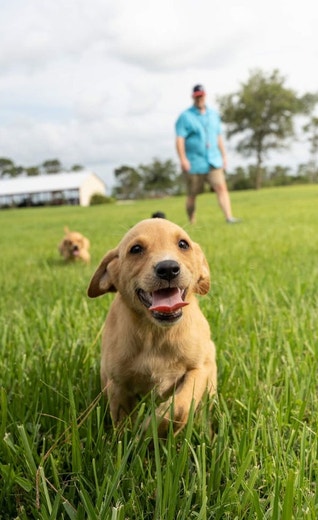
Choosing The Right Puppy For You
Whether it’s from a breeder or a shelter, there’s a lot involved with puppy adoption to consider before you bring home your new best friend. A puppy will become part of your family’s life for up to 15 years, so it’s important to choose a breed that will naturally fit with:
- Your family
- Your lifestyle
- Your home
- Other pets
- Work/school schedule
- Budget
While considering these things as a part of puppy adoption, do some research to find out about different breeds, what kind of lifestyles they fit well with and their specific needs. Talk to your vet, friends, family and neighbors who own the types of dogs you like. Different puppies may be lively, shy or playful, but remember how you train your puppy is also hugely influential on their behavior in the future.
PUREBRED VS. MIXED BREED PUPPIES
Some breeds were bred for a specific working function, and some were bred for physical appearance and companionship. These breed-specific traits are an advantage for owners who have specific puppy adoption desires regarding temperament, size, coat type and energy level. Other owners have more general requirements and may be interested in adopting a mixed-breed dog from a shelter or rescue group. This approach to puppy adoption helps to reduce the number of homeless pets and provides a loving home to a dog in need.
ACTIVITY LEVEL
Breeds (and breed types) differ significantly in energy level and daily exercise needs. If you are a highly active person who enjoys being outdoors, sporting or herding breeds may be a good match for you. Alternatively, if your lifestyle is more sedentary, a less active toy or non-sporting breed may be a better choice for puppy adoption.
TEMPERAMENT TRAITS
Although every dog is an individual, some breed-specific behaviors are observed because of the different functions for which breeds were originally developed. For example, sporting breeds such as Retrievers and Spaniels tend to be very sociable with people and other dogs, while some of the herding and working breeds tend to be more “one-family” dogs. Similarly, some working breeds are naturally more protective than are many of the hunting breeds. Thoroughly research the breeds that you are interested in for puppy adoption to learn about temperament traits that may (or may not) fit with your lifestyle and personality.
GROOMING REQUIRED
Longhaired dogs require frequent brushing to avoid mats and to keep their coat and skin healthy. Shorthaired breeds require less brushing but still shed and require occasional brushing. Some breeds, such as Poodles and Schnauzers, require periodic professional grooming. Finally, although some breeds do shed at a slower rate than others, all dogs shed at some time during the year (with the exception of the completely hairless breeds, of course).
HEALTH AND VITALITY
Health is of utmost importance for puppy adoption. Ask the breeder or caretaker about vaccinations and dewormings and any known health issues. Puppies should ideally have had one series of vaccines and at least one deworming prior to adoption. If you are adopting an adult, ask about the dog’s vaccination and healthcare history. A healthy animal has clear eyes, clean ears, white teeth and a healthy skin and coat.
BEHAVIOR AND TEMPERAMENT
In general, a “middle of the road” approach to puppy adoption often works best when assessing a dog’s temperament. While you should avoid a puppy who is extremely timid or fearful, it is also not wise to select the most bold and outgoing youngster. A dog or puppy that is alert, curious and friendly to visitors is often a good choice for a family pet. Spend time playing with potential pets and discussing each animal’s personality with the breeder or foster caretaker—the best judges of each puppy’s personality.
MEET THE PARENTS
If you’re buying a purebred puppy or if the rescue group has fostered the mother with the puppies, visit with the mother (and father, if possible). Although puppies are not “replicas” of their mother, they will inherit some of her temperament traits and also learn from her behavior at an early age.




